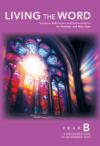Scripture Study for
Seventeenth Sunday in Ordinary Time
1 Kings 3:5, 7–12 / Psalm 119:97a / Romans 8:28–30 / Matthew 13:44–52 [44–46]
<< Back to LECTIONARY RESOURCES
Understanding the Word
By Dianne Bergant, C.S.A.
Solomon asks for an understanding heart so that he can rule his people wisely. This request shows his concern for God’s people, not merely for himself. It is no wonder that God is pleased with him. The very last verse of the passage reinforces the tradition of Solomon’s wisdom, claiming that no one before him or anyone after him could compare with him. The wisdom referred to here is not experiential wisdom, the kind that stems from reflection on experience; it is really a gift from God. God chose Solomon to be king, and gave him the wisdom he needed to rule wisely.
Paul’s insistence that all things work for good should not be misunderstood as meaning that everything will work out in the end. Rather, it implies a profound trust that God can bring good even out of misfortune. Paul’s teaching on predestination has often been misunderstood. He states that God foreknew from the beginning of time and with divine power predetermined who would be called, justified, and glorified. And who are the ones called? Nowhere does Paul suggest that some are predestined to salvation and others to perdition. Rather, the entire Christian tradition provides the answer to the question. All are called to be justified and glorified.
The parables of the treasure in the field and the pearl of great price both suggest that the kingdom of God is present though unperceived. However, only the very shrewd discover it and sacrifice everything in order to possess it. The parable of the net is quite different. Like the parable of the wheat and the weeds (see Matthew 13:40b–42, Sixteenth Sunday), it describes a community consisting of both good and bad. Only at the end of the catch will the fish be separated. Jesus asks if the disciples understand his teaching, because they must see that, like the old and new treasures of the householder, the teaching of Jesus, though radically different, is grounded in the original tradition.
